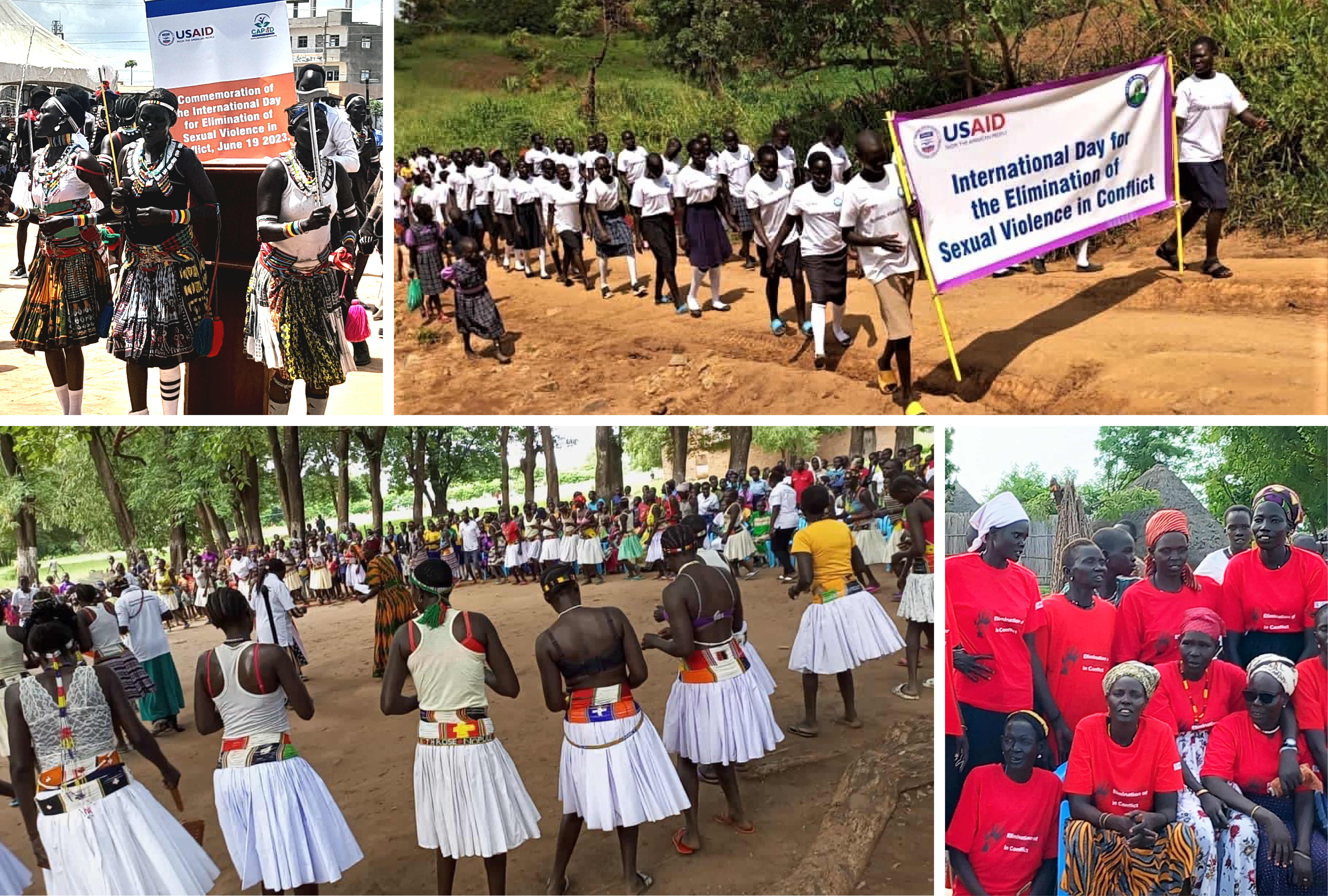
New conflicts bring a rising tide of human tragedy, including new waves of war’s oldest, most silenced, and least condemned crime – sexual violence. Conflict-related sexual violence, whether against women, girls, men, or boys continues to be used as a tactic of war, torture, and terrorism, and within communal violence found amongst more traditional pastural and clan societies. Due to cultural stigma and shame, most sexual violence goes unreported and undocumented, and so remains the shadowed crimes of conflict.
Every June 19, the United Nations General Assembly marks the International Day for the Elimination of Sexual Violence in Conflict. This day raises awareness, honors the victims and survivors of sexual violence, and pays tribute to those who stand up for the eradication of these crimes.
For this year’s day, the USAID South Sudan Shejeh Salam (“promoting peace”) Activity, implemented by DT Global, stood with citizenry and its local partners to raise awareness and say NO to this form of crime, which is unfortunately prevalent throughout South Sudan.
“We should recognize this day, be an advocate and ambassador to eliminate sexual violence in conflicts. Perpetrators should be punished and brought to book,” said David Ayuel, a community and youth leader from Juba. “Let’s fight together to condemn and end this.”
Shejah Salam teams galvanized partners, grantees, and staff in the Activity’s regions and held colorful events in commemoration of this day. Motivational speeches from traditional leaders moved crowds to cheers, and the Activity used song, dance, drama, and sports to relay important messages in support of women’s protection, honor, and education.
“This day is very important because it spreads awareness about this violent crime and encourages women to speak up against it rather than hide from it,” said Kurkur Lothilem Kabarze, Chairperson for local CSO Women for Peace Initiative in Pibor County, Jonglei State. “This gives me power as a community leader to help mobilize women against gender-based violence (GBV) in Pibor.”
According to the UN, an estimated 2.6 million people in South Sudan were at risk of GBV in 2022, a staggering 25 percent increase on 2021 estimates. Nearly 40 percent of women and girls reported having to avoid essential public places like water points, washrooms, markets, and firewood collection sites out of fear of being attacked, raped, or sexually exploited. Women must travel in large groups to protect themselves from men when venturing out for food collection or small-scale work and must return before nightfall. The dangers men pose to women and girls is exacerbated by entrenched communal conflict, feuding and raids, catastrophic climate shocks, and public health challenges.
South Sudanese women and girls are at high risk of GBV and of forced and child marriage. Many parents turn to child and forced marriage (as daughters are sold for dowry) to safeguard from grinding poverty, especially during a crisis and when they can't afford to send young girls to school. UNICEF estimates that half of all girls in South Sudan are married before the age of 18. On the other side of the age scale, too often husbands desert or threaten their older wives when unable to provide for their families, thus making them more vulnerable.
“There are adultery cases being heard within the Akobo traditional courts system every day, but there remain many unreported cases of sexual violence, said Mr. Ruach, Akobo Traders Union Representative in Akobo County, Jonglei State. “I appeal to all of you to raise awareness in our community about this crime and discourage it. Don’t force your girls into early marriages, and don’t submit to someone’s sexual desire in exchange for money or a job”
As a peacebuilding, social coherence, and resilience activity, the USAID Shejeh Salam recognizes the need to say NO to sexual violence and factors this messaging into its grassroots fieldwork and peacebuilding activities.
Determined to help eradicate sexual violence in conflict, Shejeh Salam now incorporates GBV awareness training into its activities in all areas of operations. The Activity strategically developed the Gender Equity, Disability and Social Inclusion (GEDSI) training guide and tools to ensure diversity, protection, and social inclusion within Shejeh Salam activities. The Activity developed the GBV module in this guide using findings from the Activity’s Gender Youth and Social Inclusion Analysis that identified rampant sexual violence across the program’s areas of operations. The GEDSI guide and tools are integrated into Shejeh Salam’s work with traditional authorities and transitional justice, training on basic human rights, and GBV awareness.
“Women in Akobo play a vital role in advocating for peace in their community,” said an Akobo Women’s’ Group Representative – one of the Activity’s grantees in Akobo, Jonglei state. “One of the most significant ways that our Akobo Women’s group has contributed to peace is by encouraging our husbands and brothers to give up raiding. This helps to minimize sexual violence – as well as all forms of violence – in conflict.”
Ending sexual violence in conflict will take a lot more effort than a once per year day of international commemoration. But this is a start in removing the dark shadows that cover this crime and bringing it to light. In South Sudan, we are saying NO all year long. We urge the rest of the world to follow us.